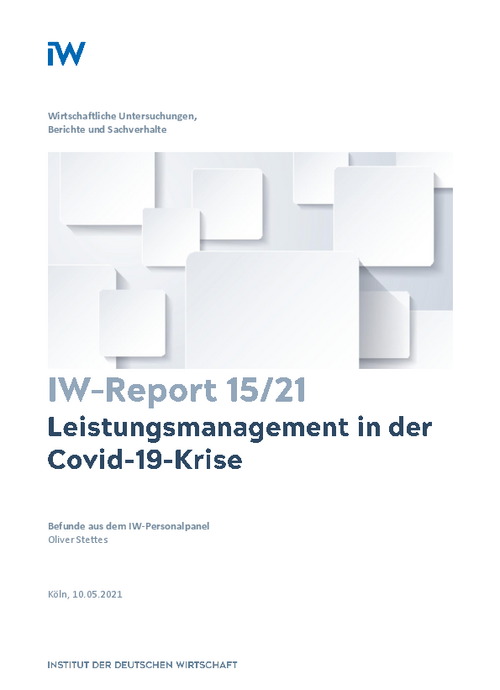Empirical evidence based on the IW Personnel Survey reveals that around half of the companies in Germany reported negative economic effects of the Covid-19-pandemic.

Performance Management in the Covid 19 Crisis: Findings from the IW Personnel Panel

Empirical evidence based on the IW Personnel Survey reveals that around half of the companies in Germany reported negative economic effects of the Covid-19-pandemic.
An adversial impact was frequently accompanied by a reduction in the workforce. However, if a profit sharing scheme exists the likelihood of job losses has significantly been reduced by 16 percentage points. Thus, the empirical evidence supports the hypothesis that profit-sharing may be beneficial for securing employment, at least at the company-level.
The existence of profit sharing – implemented in roughly one in four companies – correlates significantly positively with the distribution of special bonus payments in 2020. The latter, however, are much more prevalent. One in two companies (51 %) paid a premium last year. Special payments have also been made in many companies negatively affected by the Corona pandemic. The probability of a payout under such circumstances increases with a higher proportion of skilled workers and academic professionals. This evidence suggests that due to the competition for skilled workers firms stick to bonus payments despite an unfavourable development in order to reduce the risk of an impending brain drain to competitors.
The widespread use of short-time working schemes was not able to prevent but, at least, mitigated job losses at the company-level. Furthermore, the risk remains that workers who currently are protected by short-time working schemes may become unemployed when the legally extended reference period (up to 24 months) will eventually expire on 31 December 2021.
Many firms stock up the short-time working allowances that the workers receive by the employment agencies. The suspension of originally planned or regular pending salary increases as well as wage cuts are only applied by a minority of companies. Thus, the evidence indicates that the bulk of firms triesto shield employees from incomes losses due the covid-19-crisis.

Performance Management in the Covid 19 Crisis: Findings from the IW Personnel Panel

More on the topic

Leadership in transformation: Megatrends and management as a driver of change
Leadership dynamics in companies are subject to constant change in order to meet the challenges of their time. Today, the greatest influences result from developments such as demographic change, globalization, individualization, structural change and ...
IW
Orphaned executive chairs in German companies
In 2023, half of the companies in Germany reported increasing problems in filling vacancies for management positions because employees are not aiming for a career. Larger companies are less affected than small companies.
IW